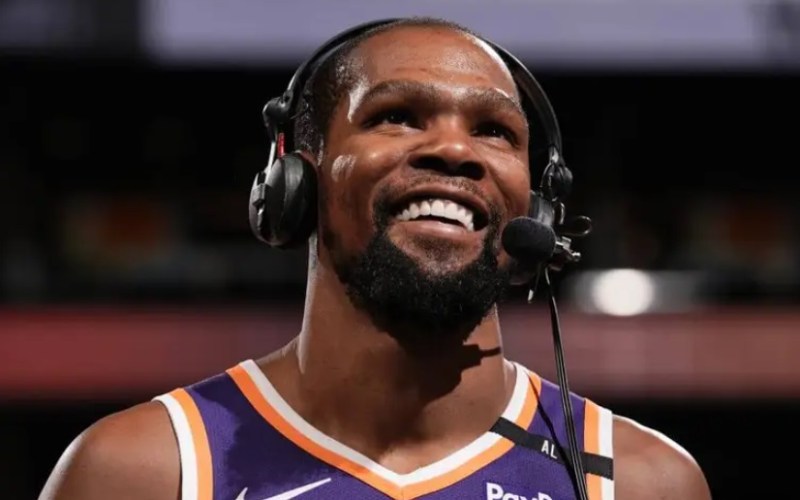Kevin Durant recently gave a candid interview to The Athletic in which he did not hold back in criticizing ESPN’s Stephen A. Smith, calling out the well-known sports commentator for his approach to covering the NBA and its players.
“Yeah, Stephen A., I don’t understand how people even listen to Stephen A.,” Durant told The Athletic. “I’ve been in the league for 18 years. I’ve never seen Stephen A. at a practice, or a film session, or a shoot-around. I’ve never seen him anywhere but on TV talking s— about players. … He’s a clown to me. He’s always been a clown. You can write that, too.”
Durant’s harsh words came in response to recent criticism from Smith. A couple of weeks ago, during an episode of ESPN’s “First Take,” Stephen A. Smith called out Durant, questioning his ability to be a leader. Smith’s comments were part of an ongoing narrative often pushed by the media that Durant, despite his undeniable talent, lacks the leadership qualities that many expect from a superstar.
Durant was quick to respond on social media, firing back on Twitter shortly after Smith’s segment aired. However, it didn’t end there, as Durant reignited the feud in his interview with The Athletic, taking direct aim at Smith’s credibility.
For Stephen A. Smith, Durant’s comments were an opportunity—a chance to create more content and keep the conversation going. On Monday’s episode of “First Take,” Smith devoted an entire segment to addressing Durant’s remarks, defending his position while taking a few shots of his own at the Phoenix Suns star. For Smith, this type of back-and-forth is exactly what fuels his show and keeps viewers engaged.
This dynamic is part of a larger pattern that often plays out between athletes and media personalities. Durant is, first and foremost, a professional athlete—one of the greatest basketball players of his generation.
His primary focus is on his game, leading his team, and performing at an elite level. On the other hand, Stephen A. Smith’s role is to provide commentary, analysis, and, more often than not, to generate reactions with his often polarizing opinions.
When an athlete like Durant engages directly with a media personality, it almost always results in a win for the commentator. By responding to Smith’s criticism, Durant gives Smith exactly what he wants—relevancy, attention, and fresh content for his show. For Smith, being called out by Durant on such a public stage only amplifies his reach and influence. It allows him to frame himself as someone important enough to get a reaction out of one of the NBA’s biggest stars. The controversy creates buzz, generates clicks, and ultimately boosts ratings.
For Durant, however, the outcome is far less beneficial. By publicly calling out Stephen A. Smith, Durant risks feeding into the media circus and giving more weight to the narratives that he claims to dislike. Instead of focusing on his performance on the court, the attention shifts to his feud with Smith, allowing critics to question his focus and mindset.
This is not the first time Durant has found himself in a public dispute with a media figure—he has a history of engaging with his critics, both online and in interviews. While this approach might resonate with some fans who appreciate his honesty and willingness to speak his mind, it often results in more distractions and headlines that detract from his on-court accomplishments.
Stephen A. Smith is well aware of the influence he wields as a prominent media personality. His job is to entertain, inform, and provoke, and he has made a career out of doing just that.
By pushing Durant’s buttons, Smith succeeds in creating compelling television, and in the world of sports media, compelling television is king. Whether or not his criticism of Durant is fair or accurate becomes secondary to the spectacle of the feud itself.

Ultimately, the exchange between Durant and Smith is a reminder of the different roles that athletes and media members play in the modern sports landscape. Durant’s job is to perform at the highest level, to lead his team, and to continue building on a legacy that already places him among the all-time greats. Smith’s job, meanwhile, is to provide commentary that engages audiences, even if that means pushing narratives that players like Durant find frustrating or unfair.
While it’s understandable that Durant would want to defend himself against what he sees as baseless criticism, the reality is that engaging with commentators like Stephen A. Smith often plays right into their hands.
For Smith, a public feud with a superstar athlete is a goldmine of content—a way to keep his name in the headlines and ensure that viewers keep tuning in to see what he’ll say next. For Durant, however, the benefits are far less clear, as the focus shifts away from his game and toward a war of words that ultimately benefits the media more than the athlete.
In the end, Durant’s talent and achievements speak for themselves, and while his willingness to speak out may resonate with some fans, it’s clear that the back-and-forth with media figures like Stephen A. Smith is unlikely to end anytime soon.
For Smith, it’s a win. For Durant, it’s a reminder that sometimes the best response is simply to let your game do the talking.







